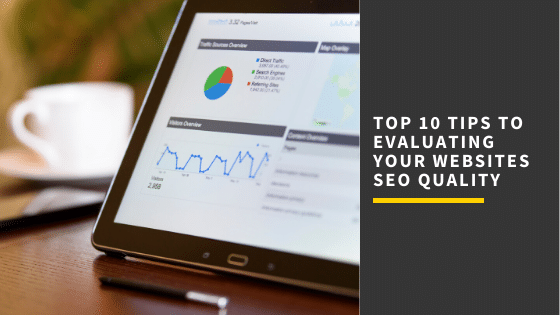Top 10 Tips to Evaluate Your Website SEO Quality

Take your content optimisation strategy to the next level with these tips.
1. Don’t use multiple H1 tags
There shouldn’t be multiple H1 tags on a single page. The H1 tag is the focus of the page’s topic, and thus it should only occur on the page once.
2. Your website should be easily crawlable
Having an XML sitemap makes your website much easier to crawl by the search engines. Things like 4xx and 5xx errors in the sitemap, non-canonical URLs in the sitemap, blocked pages in the sitemap, sitemaps that are too large, and other issues should be looked at to gauge how the sitemap impacts the quality of a website. Issues can also occur when error pages are not properly configured.
3. Do not use Thin Content
High quality thin content that answers a user’s query, is not necessarily an issue. It can become an issue when it adds no value at all. Thin content should not be measured by word count but in terms of quality, uniqueness, authority, relevance, and trust.
4. When reusing existing code, don’t just ‘copy and paste’ it
Copying and pasting code is not as simple as it sounds. This is usually because the developer copied and pasted the code that was written for one DOCTYPE and used it for another – such as copied code for XHTML 1.0 into an HTML 5 DOCTYPE. Thus, encountering thousands of errors. This is why it is so important to consider if you’re transferring a site to WordPress the DOCTYPE that is being used.
5. Add Schema.org structured data where applicable
Schema is key to obtaining rich snippets in the SERPs on Google. Even if your site does not lend itself well to certain industries that have specific structured data elements, there are ways to add structured markup anyway. First, performing an entity audit is useful for finding what your site is doing already. If nothing, you can correct this inequity by adding Schema to things like:
- Navigation
- Logo
- Phone number
- Certain content elements that are common on every website
- You can add Schema.org Structured Data to videos as well
6. Use Responsive Design
With the arrival of Google’s mobile-first index, having responsive design on your website is even more important. To create a responsive design, you can utilise HTML 5 and CSS 3 Media Queries.
7. Make sure CSS & JavaScript isn’t blocked in robots.txt
This is important, because robots.txt should not block CSS or JS resources at all. Google sent out a mass warning in July 2015 about blocking CSS and JS resources. So be sure not to block them.
8. Makes sure all pages have titles and meta descriptions
If your page is missing a title or description, Google with automatically generate them. You don’t want to leave anything to chance when it comes to optimizing a site properly, so all page titles should be manually written. Also, Meta keywords should also be considered. Carefully and strategically adding meta keywords can add points of relevance to the document, as well as giving your website a boost.
9. Check your page speed
It is important to test and find out the actual page speed of your top landing pages. Google recommends 2-3 seconds, although you should aim for your website to be better than this – but above all, better than your competition.
You could use a content delivery network to decreases the distance between servers and customers, thus increasing site performance and speed significantly.
10. Optimise your keywords
Your keywords should be well optimised into your copy and read well with surrounding text and not seem like spam. Before writing your content, it is best to preform targeted keyword research.
Here’s a few ways you can optimised your keywords:
- Use targeted keywords throughout the body copy including in headings.
- Use keyword variations.
- Include lists, images, and quotes in your copy where contextually relevant and needed.
- Make sure each landing page has a unique keyword or phrase.
If you would like some advice on your website’s SEO, please contact our dedicated team of creative engineers now. We’d be more than happy to assist with your site optimisation.
